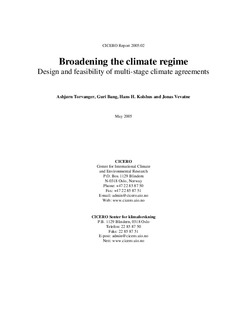Broadening the climate regime: Design and feasibility of multi-stage climate agreements
Research report
Permanent lenke
http://hdl.handle.net/11250/192000Utgivelsesdato
2005Metadata
Vis full innførselSamlinger
- CICERO Reports [210]
Sammendrag
To meet a climate target like maximum 2 ºC temperature increase by 2100, participation in efforts to reduce emissions of greenhouse gases must be broader than that in the Kyoto Protocol. It will also require emission reductions efforts in developing countries. The 'multi-stage' approach is an interesting idea, where countries take on stronger emission mitigation commitments as they develop and expand their per capita gross domestic product and greenhouse gas emissions. This report examines a three-stage variant of the multi-stage approach, where countries with low GDP and emissions per capita are placed in stage 1 and have no commitments, countries with medium level GDP and emissions are placed in stage 2 and must limit emissions relative to GDP, and countries with the highest GDP and emissions per capita are placed in stage 3 and must reduce emissions in absolute terms. We explore how far different variants of an index based on per capita GDP and emissions can take us in the direction of pointing out a politically feasible regime architecture, where the most important political feasibility indicator is the placement of industrialized countries in stage 3 and least developed countries in stage 1. This approach may result in rapidly industrializing developing countries being placed in stage 3. A main finding is that an agreement based on an index containing GDP per capita and emissions per capita only has a relatively low political feasibility, but this is improved if Human Development or Governance indices are included, and furthermore if we require that all industrialized countries are placed in stage 3. Adaptation to climate change is of particular importance to developing countries, but is better handled through a separate protocol than linking this issue directly to the multi-stage approach.
